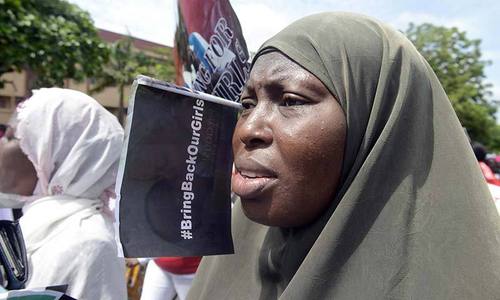LAGOS: Boko Haram released a new video on Monday claiming to show the missing Nigerian schoolgirls, alleging the teenagers had converted to Islam and would not be released until all militant prisoners were freed.
The group's leader, Abubakar Shekau, speaks on the video obtained by AFP for 17 minutes before showing what he said were the girls, in Muslim dress and praying in an undisclosed rural location.
A total of 276 girls were abducted on April 14 from the northeastern town of Chibok, in Borno state, which has a sizeable Christian community. Some 223 are still missing.
The footage shows about 130 girls in black and grey full-length hijabs sitting on scrubland near trees, reciting the first chapter of the Muslim holy book, the Koran, and holding their palms upwards in prayer.
Three of the girls are interviewed. Two say they were Christian and had converted while one said she was Muslim. Most of the group were seated. The girls appeared calm and one said that they had not been harmed.
There was no indication of when the video was taken, although the quality is better than on previous occasions and at one point an armed man is seen in shot with a hand-held video camera.
Boko Haram has been waging an increasingly deadly insurgency in Nigeria's mainly Muslim north since 2009, attacking schools teaching a “Western”curriculum, churches and government targets.
Civilians, though, have borne the brunt of recent violence, with more than 1,500 killed this year alone while tens of thousands have been displaced after their homes and businesses were razed.
Nigeria's government has been criticised for its lack of immediate response to the kidnapping but has been forced to act after Shekau threatened to sell the girls as slaves.
President Goodluck Jonathan has now accepted help from the United States, Britain, France, China and Israel, which have sent specialist teams to help in the search effort.
In the video, Shekau appears in front of a lime green canvas backdrop wearing combat fatigues and carrying an automatic weapon. Shekau does not appear in the same shot as the girls at any point during the 27-minute video.
Speaking in Hausa and Arabic, he restates his claim of responsibility made in a video released last Monday and said the girls had converted to Islam.
“These girls, these girls you occupy yourselves with... we have indeed liberated them. We have indeed liberated them. Do you know we have liberated them? These girls have become Muslims,” he said.
The militant leader said that Boko Haram's brothers in arms had been held in prison for up to five years and suggested that the girls would be released if the fighters were freed.
“We will never release them (the girls) until after you release our brethren. Here I mean those girls who have not submitted (converted to Islam),”he added.
Boko Haram has used kidnapping of women and young girls in the past and Shekau indicated that more were being held.
Eleven girls were abducted from the Gwoza area of Borno state on May 4.














































